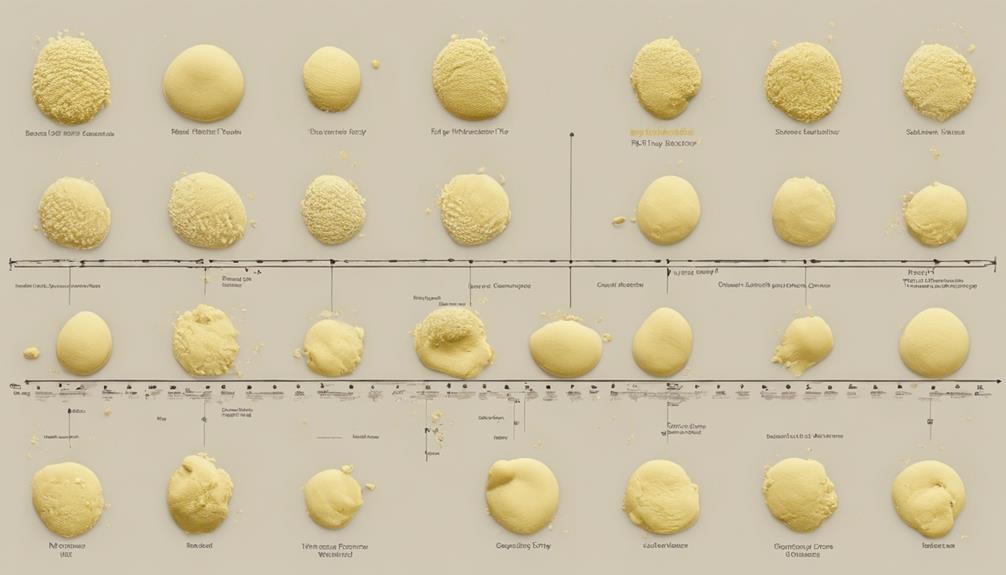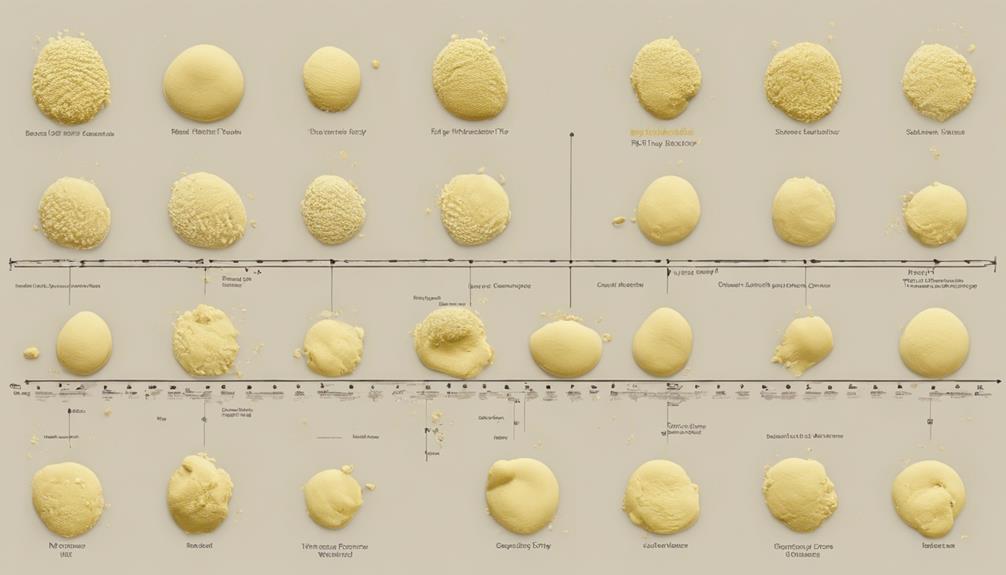As the saying goes, 'All things in moderation.' When it comes to the topic of how often a newborn poops, there's a lot to unpack.
Understanding your baby's bowel movements can provide valuable insights into their health and well-being. From the frequency of diaper changes to the color and consistency of what's inside, each detail tells a story.
So, how often should you expect your newborn to poop, and what signs should you look out for? Let's explore the world of newborn poop together.
Key Takeaways
- Breastfed newborns may poop up to 6 times daily, while formula-fed newborns typically have 1-4 bowel movements.
- Newborn poop colors can vary from yellow to green to brown, signaling digestion and potential health issues.
- Monitoring poop frequency and consistency is vital to assess newborns' digestive health and hydration levels.
- Immediate medical attention is crucial for red or black poop, signs of dehydration, or prolonged constipation in newborns.
Newborn Poop Frequency
Newborns' poop frequency can vary greatly depending on whether they're breastfed or formula-fed. Breastfed newborns tend to have more frequent bowel movements, sometimes after each nursing session. It's not uncommon for them to have up to six or more poops a day during the first six weeks. In contrast, formula-fed newborns typically have fewer but larger stools, averaging around 1-4 bowel movements daily.
Both breastfed and formula-fed newborns can exhibit a range of stool consistencies, from multiple times a day to once a week. The color of their poop can vary from yellow to green to brown, with the first sticky, tar-like stool known as meconium. It's important to pay attention to any changes in poop color, such as black, red, or white, as these could indicate underlying health issues that require medical attention.
Understanding these differences in poop frequency, consistency, and color between breastfed and formula-fed newborns can help parents monitor their babies' bowel movements and detect any potential health issues early on.
Breastfed Newborn Poop Patterns

Monitoring your breastfed baby's poop patterns can provide valuable insights into their feeding and digestive health. Breastfed newborns typically have frequent bowel movements, often pooping after each nursing session, which can amount to 6 or more times a day in the initial 6 weeks.
The mustard-yellow color of breastfed baby poop indicates proper digestion of breast milk, which is easily digestible, leading to more frequent and softer stools compared to formula-fed babies. The seedy and loose consistency of breastfed newborns' poop reflects the composition of breast milk.
Formula-Fed Newborn Poop Expectations
Understanding what to expect from your formula-fed newborn's poop can provide valuable insights into their digestive health and overall well-being. When it comes to formula-fed baby poop, here are some important points to keep in mind:
- Frequency: Formula-fed newborns typically have 1-4 bowel movements a day, which is fewer but larger stools compared to breastfed babies.
- Consistency: The stool consistency for formula-fed babies is firmer and usually yellow to brown in color.
- Color: Formula-fed baby poop is usually tan or yellow, which is distinct from the mustard-yellow color of breastfed baby poop.
- Monitoring: Tracking your formula-fed newborn's poop frequency is crucial as it can provide valuable insights into their digestive health.
Post-Newborn Baby Poop Appearance
As your baby progresses beyond the newborn stage, you may notice a noticeable shift in the appearance of their poop. Post-newborn baby poop shifts from the dark, tar-like meconium to more typical baby poop within a few days of birth. For breastfed babies, the poop tends to be seedy and mustard-like in appearance, while formula-fed babies usually have poop that is yellow-tan and resembles toothpaste. Normal baby poop colors can vary between shades of yellow, green, and brown. However, be mindful of red or black poop, as these colors may indicate gastrointestinal issues that require prompt attention. To help you better understand the differences, here is a table highlighting the typical appearances of breastfed and formula-fed baby poop:
| Aspect | Breastfed Baby Poop | Formula-Fed Baby Poop |
|---|---|---|
| Color | Mustard-like, yellow | Yellow-tan, toothpaste-like |
| Texture | Seedy | Resembles toothpaste |
| Consistency | Runny | Firmer |
When to Consult a Healthcare Provider
If your newborn hasn't had a bowel movement in over a week, it's important to consult a healthcare provider promptly. Here are four key points to consider when deciding to seek medical advice regarding your newborn's poop:
- Blood in Stool: Immediate attention is needed if you notice blood in your newborn's stool. This could indicate a potential health issue that requires medical assessment.
- Dehydration Signs: Contact a healthcare provider promptly if your newborn shows signs of dehydration related to poop frequency. Dehydration can be serious, especially in newborns, and should be addressed promptly.
- Constipation Concerns: Discuss concerns about constipation or abnormal stool patterns with a pediatrician. They can provide guidance on how to manage these issues effectively.
- Trust Your Instincts: Trust your parental instincts and seek medical help if you have worries about your newborn's poop. Your intuition as a parent is valuable, and it's crucial to address any concerns you may have promptly.
Frequently Asked Questions
How Often Should a Newborn Poop Chart?
We should keep in mind that a newborn's poop frequency can vary. It's normal for breastfed babies to poop up to 6 times a day in the first six weeks. Formula-fed babies typically have 1-4 bowel movements daily.
How Regularly Do Newborns Poop?
I comprehend the concern about newborn poop frequency. It varies, from several times a day to once a week. If you're ever unsure, trust your instincts and consult your pediatrician for guidance and peace of mind.
How Often Should a Newborn Have a Poopy Diaper?
We should expect newborns to have several poopy diapers a day, with variations based on breastfeeding or formula feeding. It's normal for babies to poop frequently during their early weeks as their digestive system is developing.
How Long Can Newborn Go Without Pooping?
I realize waiting for your newborn to poop can be nerve-wracking. It's normal for babies to go a week without pooping, but if it's longer, consult your pediatrician. Changes in poop color signal potential issues, so act promptly.
Conclusion
To summarize, monitoring your newborn's poop frequency and appearance is essential for their health.
It's like keeping an eye on a compass during a journey, guiding you through any potential issues that may arise.
Remember, every baby is unique, so don't hesitate to reach out to your healthcare provider if you have any concerns.
Stay informed, stay proactive, and guarantee your little one's well-being.









